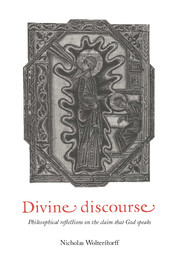Book contents
- Frontmatter
- Contents
- Preface
- 1 Locating our topic
- 2 Speaking is not revealing
- 3 The many modes of discourse
- 4 Divine discourse in the hands of theologians
- 5 What it is to speak
- 6 Could God have and acquire the rights and duties of a speaker?
- 7 Can God cause the events generative of discourse?
- 8 In defense of authorial-discourse interpretation: contra Ricoeur
- 9 In defense of authorial-discourse interpretation: contra Derrida
- 10 Performance interpretation
- 11 Interpreting the mediating human discourse: the first hermeneutic
- 12 Interpreting for the mediated divine discourse: the second hermeneutic
- 13 Has Scripture become a wax nose?
- 14 The illocutionary stance of biblical narrative
- 15 Are we entitled?
- 16 Historical and theological afterword
- Notes
- Index
10 - Performance interpretation
Published online by Cambridge University Press: 01 June 2011
- Frontmatter
- Contents
- Preface
- 1 Locating our topic
- 2 Speaking is not revealing
- 3 The many modes of discourse
- 4 Divine discourse in the hands of theologians
- 5 What it is to speak
- 6 Could God have and acquire the rights and duties of a speaker?
- 7 Can God cause the events generative of discourse?
- 8 In defense of authorial-discourse interpretation: contra Ricoeur
- 9 In defense of authorial-discourse interpretation: contra Derrida
- 10 Performance interpretation
- 11 Interpreting the mediating human discourse: the first hermeneutic
- 12 Interpreting for the mediated divine discourse: the second hermeneutic
- 13 Has Scripture become a wax nose?
- 14 The illocutionary stance of biblical narrative
- 15 Are we entitled?
- 16 Historical and theological afterword
- Notes
- Index
Summary
Let us review where we are in our discussion of interpretation. I have defended the legitimacy of discourse interpretation against Derrida's attack, or more precisely, against Derrida's rejection, by observing that whereas Derrida argues that discourse interpretation rests on assumptions characteristic of what he calls “metaphysics,” when it comes to metaphysics itself he doesn't argue but simply declares his rejection. And I have defended the autonomy of authorial-discourse interpretation against Ricoeur's attempt to assimilate it to textual sense interpretation.
Why there's no such thing as the sense of a text
I want now to take this last point farther, and argue that there is no such thing as the sense of a text, as Ricoeur and those in the general tradition of New Criticism understand that. It follows that textual sense interpretation is not a viable mode of interpretation. That does not leave authorial-discourse interpretation to occupy the field of interpretation all by itself. There is another coherent and viable mode of interpretation – performance interpretation, I will call it. After showing the non-viability of textual sense interpretation, I will go on to explain this alternative mode; and then conclude by pointing out why it is not relevant to our purposes here.
The sense of a text is understood to be a function of the meanings of the sentences comprising the text; so that, for a given text, if one knows the sentences comprising the text and the meanings of those sentences, one knows everything necessary to determining the sense of that text.
- Type
- Chapter
- Information
- Divine DiscoursePhilosophical Reflections on the Claim that God Speaks, pp. 171 - 182Publisher: Cambridge University PressPrint publication year: 1995



